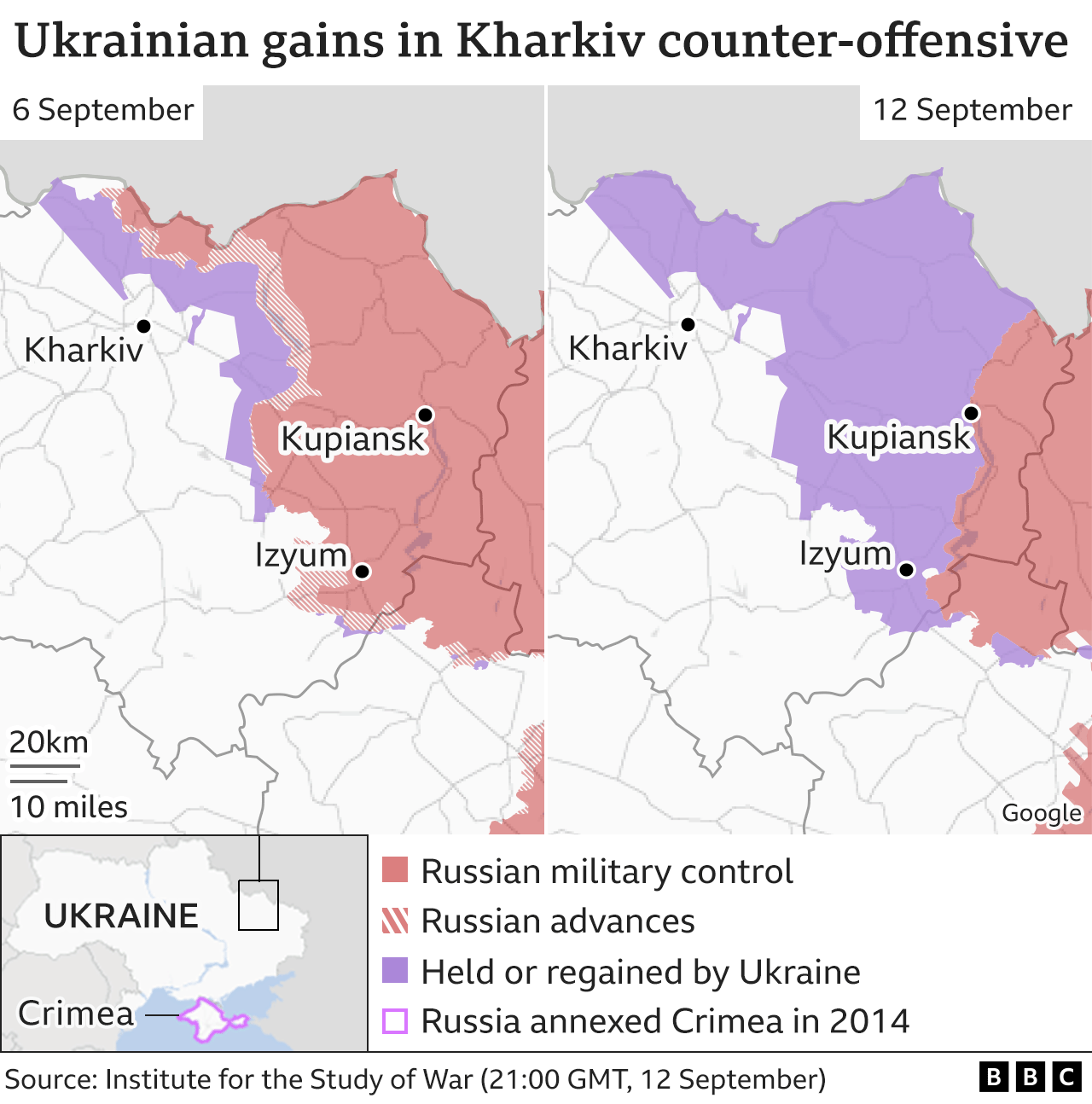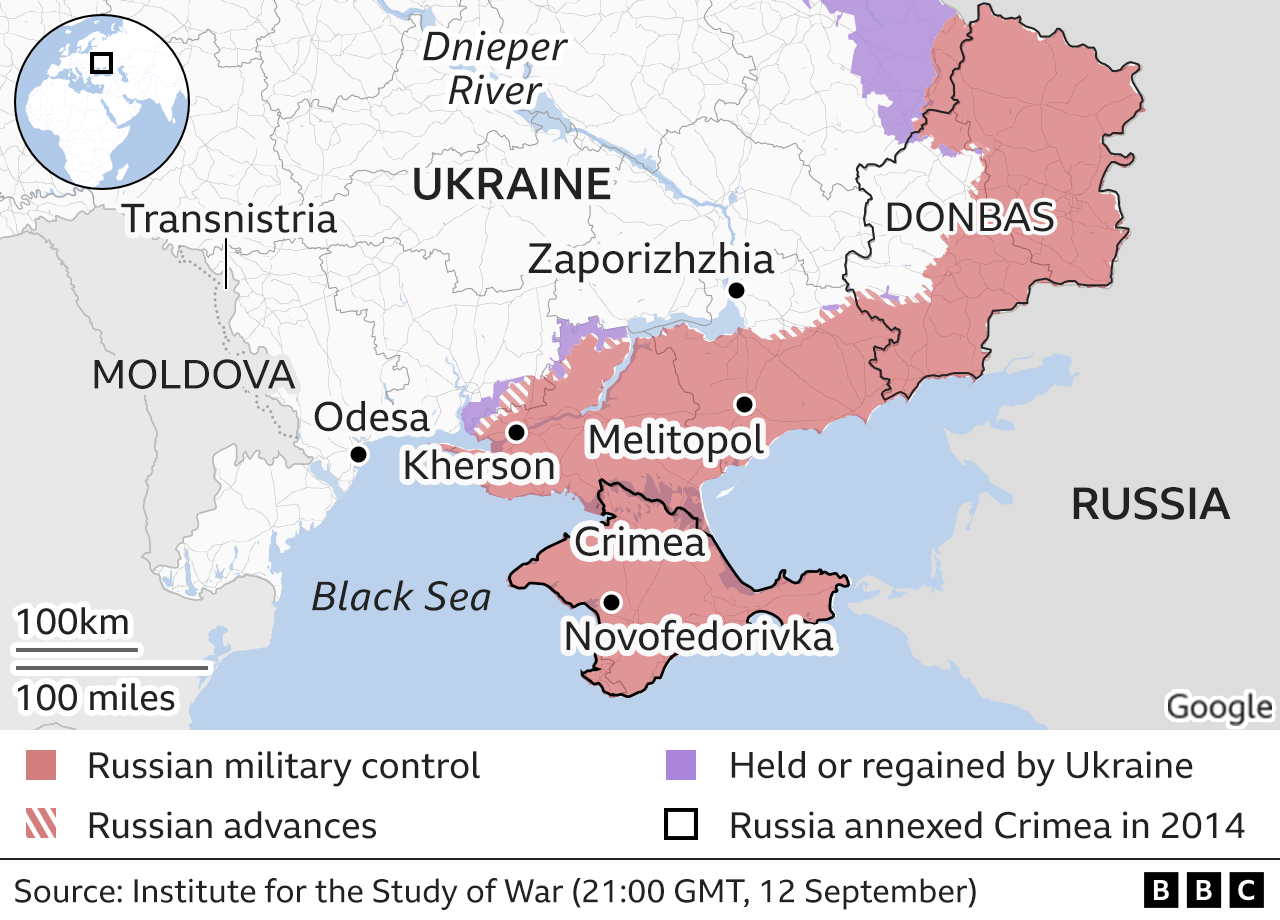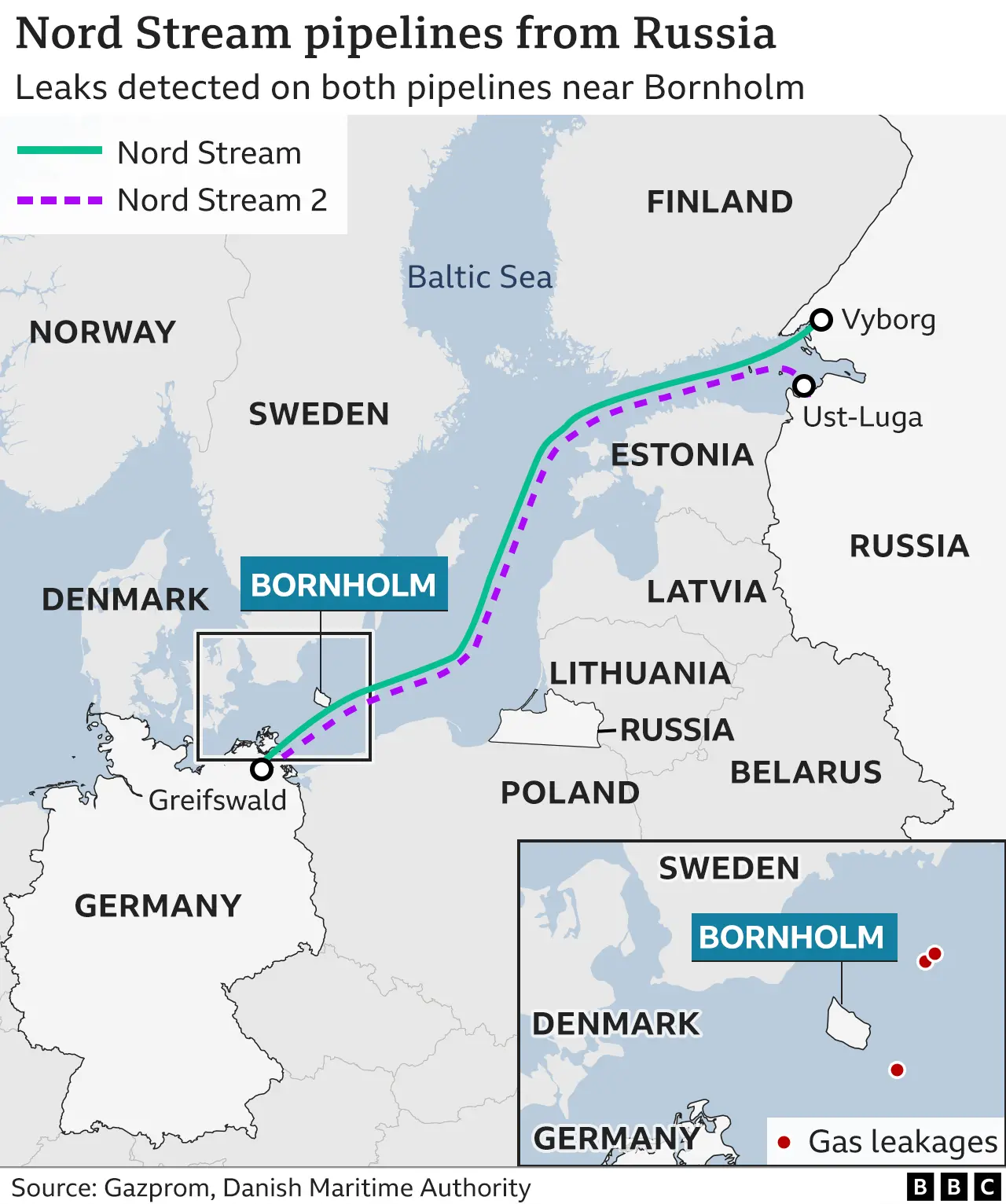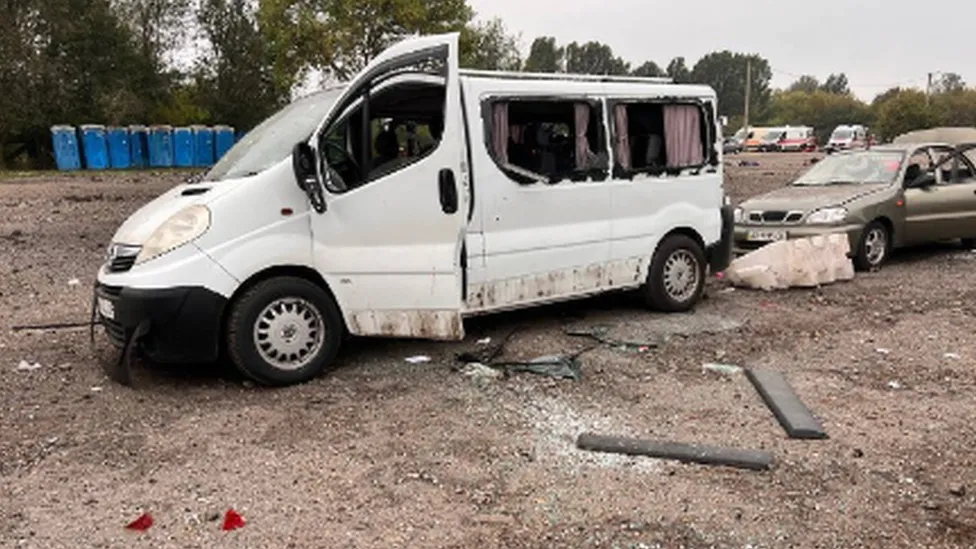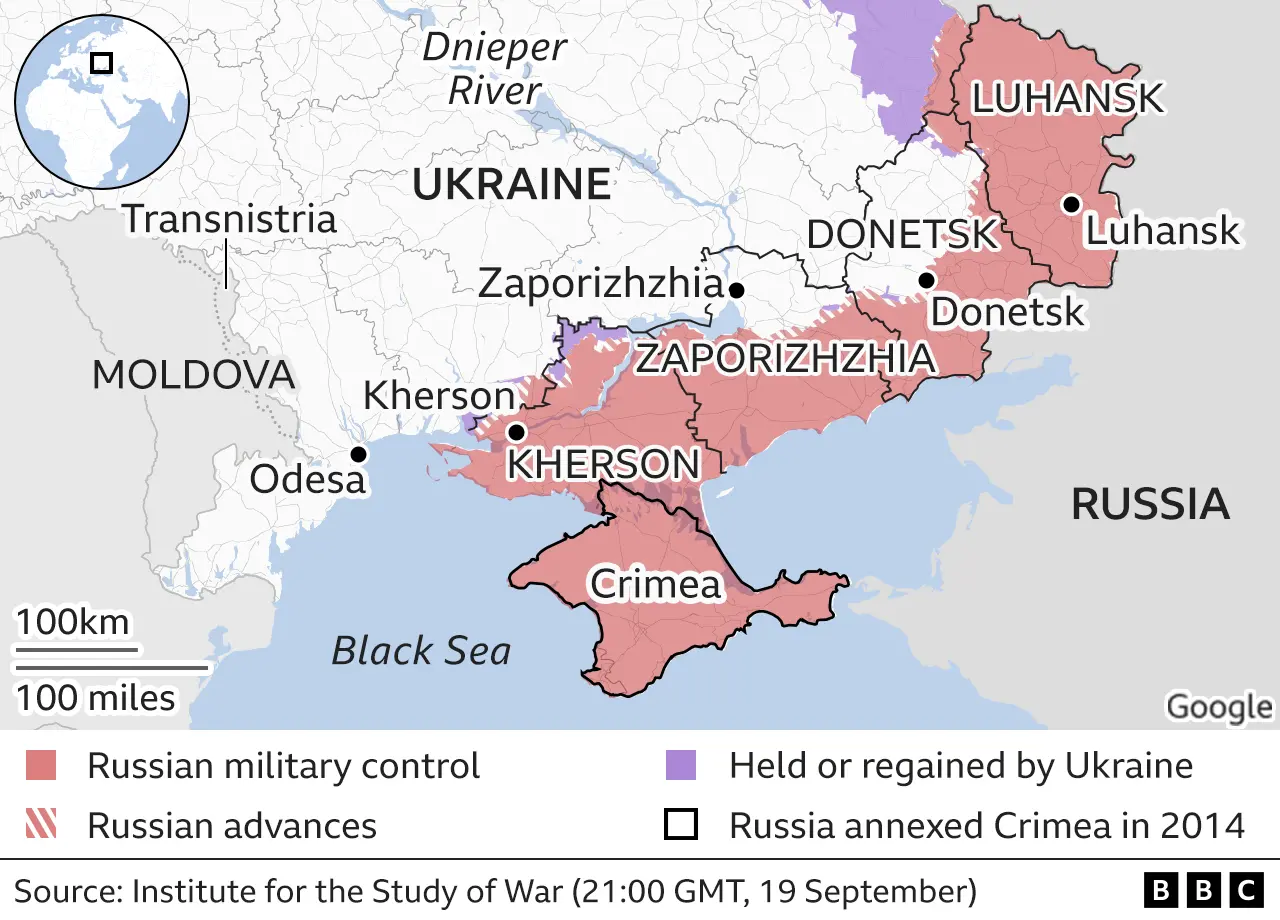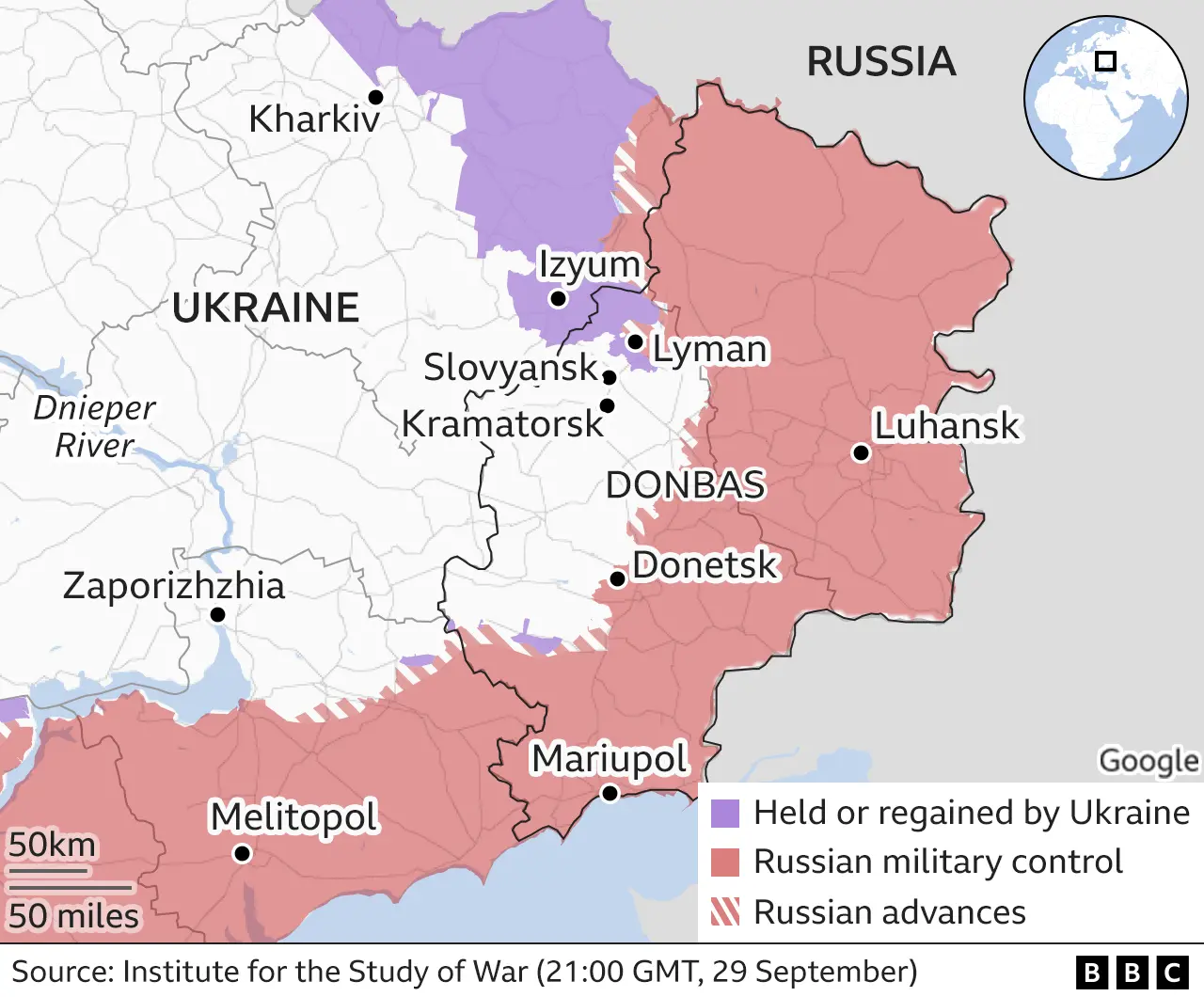Ukraine war: Russia to open war enlisting hub on Georgia border
By Yaroslav Lukov
BBC News
Published 2 hours ago
Media caption,
Watch: Drone video shows scale of people leaving Russia via Georgian border
Russia is to open an army enlisting centre on the border with Georgia, where massive queues have formed as Russian men try to flee the country to avoid being sent to fight in Ukraine.
Officers at the Verkhniy Lars crossing will be tasked with serving summons to "citizens of the mobilisation age", the authorities say.
Recent satellite images have shown queues going for miles from Russia.
All those crossing into Georgia look exhausted, a BBC correspondent says.
They are hungry and sleep deprived - but relieved to have reached safety, Rayhan Demytrie says. People have been coming in groups of walkers, dragging their suitcases behind them. Others have arrived in car or on bikes.
One man, Ilya, showed our correspondent a polaroid of his baby daughter Arisha. He said he wanted to see her grow up, and not die in the senseless war in Ukraine.
Dima and Zhenya, two brothers in their early 20s, said they had travelled for days from Bashkiria - Russia's republic about 1,500km (932 miles) east of the capital Moscow.
Dima asked for a hotspot to call his mother. On the other end of the line there was a sigh of relief.
Young man, a woman with a baby and children walk to cross the border from Russia into Georgia. Photo: 27 September 2022
IMAGE SOURCE,GETTY IMAGES
Image caption,
Military-age men - as well as women and young children - have been desperately trying to flee Russia
Another young man from Moscow said the reason he was fleeing was because of the man in the Kremlin, President Vladimir Putin.
Everyone says the same thing: they disagree with the war - but the extent of repression in Russia makes them powerless, our correspondent says.
The interior ministry of Russia's North Ossetia republic, where the Verkhniy Lars crossing is, said 60 of its personnel had already been deployed there, describing the situation as "extremely tense".
It added that the army enlisting centre would be opened "in the nearest future".
Long queues have also been reported on Russia's border crossings with Mongolia and Kazakhstan.
Kazakhstan's President Kassym-Jomart Tokayev vowed on Tuesday to protect the safety and welfare of Russians fleeing a "hopeless situation".
The Russian defence ministry on Tuesday said it would not seek the extradition of Russian nationals travelling abroad to avoid being drafted into the army.
President Putin announced what he described as a partial mobilisation on 21 September, with Defence Minister Sergei Shoigu later saying 300,000 reservists would be called up.
But reports in opposition Russian media suggested that up to one million people could be called up, pointing out that the actual number of those who would be enlisted was classified.
A number of military experts in the West and Ukraine say Mr Putin's decision to call up reservists shows that Russian troops are failing badly on the battlefield in Ukraine - more than seven months after Moscow launched its invasion.
In an unusual move on Monday, the Kremlin admitted that mistakes were being made in its mobilisation drive., amid growing public opposition across the vast country.
"There are cases when the decree is violated," Mr Putin's spokesman Dmitry Peskov said, adding that "all the errors will be corrected".
On Tuesday, Sergei Baranovsky, the top official responsible for war mobilisation efforts in the extreme north-eastern Magadan region, was sacked.
Multiple reports - backed by footage on social media - say people with no military experience, or who are too old or disabled, are being called up.
Since the mobilisation announcement, more than 2,000 people have been detained at protests across Russia.
"We are deeply disturbed by the large number of people who have reportedly been arrested," UN rights office spokeswoman Ravina Shamdasani said on Tuesday.
In one of the most shocking and widely-discussed incidents, a man shot and critically injured an army recruitment officer in the Siberian city of Ust-llimsk on Monday.
By Yaroslav Lukov
BBC News
Published 2 hours ago
Media caption,
Watch: Drone video shows scale of people leaving Russia via Georgian border
Russia is to open an army enlisting centre on the border with Georgia, where massive queues have formed as Russian men try to flee the country to avoid being sent to fight in Ukraine.
Officers at the Verkhniy Lars crossing will be tasked with serving summons to "citizens of the mobilisation age", the authorities say.
Recent satellite images have shown queues going for miles from Russia.
All those crossing into Georgia look exhausted, a BBC correspondent says.
They are hungry and sleep deprived - but relieved to have reached safety, Rayhan Demytrie says. People have been coming in groups of walkers, dragging their suitcases behind them. Others have arrived in car or on bikes.
One man, Ilya, showed our correspondent a polaroid of his baby daughter Arisha. He said he wanted to see her grow up, and not die in the senseless war in Ukraine.
Dima and Zhenya, two brothers in their early 20s, said they had travelled for days from Bashkiria - Russia's republic about 1,500km (932 miles) east of the capital Moscow.
Dima asked for a hotspot to call his mother. On the other end of the line there was a sigh of relief.
Young man, a woman with a baby and children walk to cross the border from Russia into Georgia. Photo: 27 September 2022
IMAGE SOURCE,GETTY IMAGES
Image caption,
Military-age men - as well as women and young children - have been desperately trying to flee Russia
Another young man from Moscow said the reason he was fleeing was because of the man in the Kremlin, President Vladimir Putin.
Everyone says the same thing: they disagree with the war - but the extent of repression in Russia makes them powerless, our correspondent says.
The interior ministry of Russia's North Ossetia republic, where the Verkhniy Lars crossing is, said 60 of its personnel had already been deployed there, describing the situation as "extremely tense".
It added that the army enlisting centre would be opened "in the nearest future".
Long queues have also been reported on Russia's border crossings with Mongolia and Kazakhstan.
Kazakhstan's President Kassym-Jomart Tokayev vowed on Tuesday to protect the safety and welfare of Russians fleeing a "hopeless situation".
The Russian defence ministry on Tuesday said it would not seek the extradition of Russian nationals travelling abroad to avoid being drafted into the army.
President Putin announced what he described as a partial mobilisation on 21 September, with Defence Minister Sergei Shoigu later saying 300,000 reservists would be called up.
But reports in opposition Russian media suggested that up to one million people could be called up, pointing out that the actual number of those who would be enlisted was classified.
A number of military experts in the West and Ukraine say Mr Putin's decision to call up reservists shows that Russian troops are failing badly on the battlefield in Ukraine - more than seven months after Moscow launched its invasion.
In an unusual move on Monday, the Kremlin admitted that mistakes were being made in its mobilisation drive., amid growing public opposition across the vast country.
"There are cases when the decree is violated," Mr Putin's spokesman Dmitry Peskov said, adding that "all the errors will be corrected".
On Tuesday, Sergei Baranovsky, the top official responsible for war mobilisation efforts in the extreme north-eastern Magadan region, was sacked.
Multiple reports - backed by footage on social media - say people with no military experience, or who are too old or disabled, are being called up.
Since the mobilisation announcement, more than 2,000 people have been detained at protests across Russia.
"We are deeply disturbed by the large number of people who have reportedly been arrested," UN rights office spokeswoman Ravina Shamdasani said on Tuesday.
In one of the most shocking and widely-discussed incidents, a man shot and critically injured an army recruitment officer in the Siberian city of Ust-llimsk on Monday.
